 Tribute
to Courage Tribute
to Courage |
"The intensity of the violence that
exploded in Rwanda in April 1994 was overwhelming.
Many Rwandese who did not condone the genocide may
have either felt there was nothing they could do
to prevent it or have simply been paralysed by fear.
There were those, however, who were armed with unfailing
courage and humanity and did everything they could
to save lives. This book tells the stories of some
of the men and women who fought to protect others.
Survivors describe their experiences and speak of
their feelings for the people who saved them. These
are moving records of fear and gratitude, of human
triumphs in the face of catastrophe."
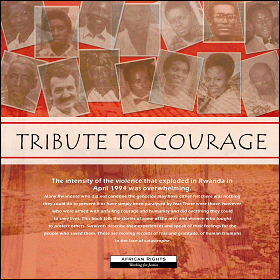
This 299 page book is also available in French.
For details contact African Rights in Kigali: Tel.
(250)501007; Fax:(250)501008
Email: rights@rwandatel1.rwanda1.com
Web site: www.users.globalnet.co.uk/~afrights
African Rights
African Rights is a human rights organisation that
has researched and published books, reports and
articles on abuses suffered by men, women and children
in Democratic Republic of Congo, Kenya, Rwanda,
Sudan, Somalia, Somaliland, Uganda and Zimbabwe.
In Rwanda, African Rights has been documenting the
genocide since 1994 and has gathered rich testimony
from survivors, witnesses and perpetrators. This
research has been of value to both the Rwandese
and the international initiatives aimed at justice.
In the process of collecting these testimonies,
the stories of those who stood firm against a tide
of unprecedented atrocities came to light. They
cast glimmers of light over a nation still in the
shadow of its horrific past.
TRIBUTE TO COURAGE
Acts of individual heroism in the face of genocide
are the subject of African Rights' latest book,
Rwanda: Tribute to Courage, a collection of remembrances
from survivors and witnesses of the genocide, told
publicly for the first time. The book, available
from October, names men and women from all walks
of life who risked their lives to save others and
tells the compelling stories of their achievements.
Many of them became martyrs, killed with the people
they sought to defend. Their deaths are deeply mourned.
They are moving accounts of fear and gratitude,
of human triumphs in the face of catastrophe.
The Individuals: From All Walks of Life
The struggle against the genocide-and the attitudes
which led to the killings-was lonely and extremely
dangerous. But courage surfaced in unexpected places
during the genocide and many ordinary peasants or
villagers used their limited resources to help others
while the educated or the wealthy turned refugees
away. The women mentioned in the book are among
the most astonishing heroes. The story of how an
elderly, poverty-stricken traditional healer shielded
a group of Tutsis with nothing but the strength
of her own character might seem like fiction, if
those she protected had not lived to tell it.
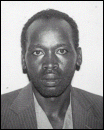 |
Frodouald Karuhije, Builder
In some households there are generations of
heroes. Frodouald's father saved the life
of a Tutsi in Gitarama in 1973, and Karuhije
himself saved this man's daughter in 1994.
He did so by digging deep, cleverly constructed
and well camouflaged trenches on his land
where he hid 14 Tutsis, most of whom were
strangers.
|
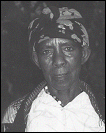 |
Sula Karuhimbi, Traditional Healer
Elderly and poverty-stricken, Sula hid a group
of Tutsis with nothing but the strength of
her own character. She fed them with the produce
of her own fields, housed them in a shelter
she had made for her animals and used her
reputation as a healer to scare off the militia
with the threat of bringing down evil spirits.
|
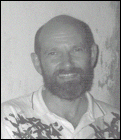 |
Wolfgang Blam, Doctor
Dr Blam, a German doctor, was one of the foreigners
who remained behind to help. He lived through
the terror unleashed upon the people of Kibuye
and was a source of strength and support for
those he met. He sought to protect as well
as treat the sick and wounded who found refuge
at Kibuye hospital, brought casualties in
from outside and extended a helping hand to
the refugees at Gatwaro stadium.
|
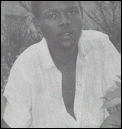 |
Paul Kamanzi, Shopkeeper
Deeply horrified about the carnage, Paul severed
his ties to his community and to his family
during the genocide, and fought his own brothers
to defend his Tutsi friends in Muhazi, Kibungo.
His sense of compassion and empathy were so
profound that he stayed with them at the commune
office despite the risk of danger, a decision
that eventually cost him his life.
|
Gabriel Mvunganyi, Farmer
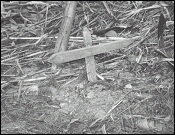
Gabriel had faced hostility for a long time for
his refusal to support the politics of ethnic
division. In 1994, he was seen as a threat to
collective support for the killings, especially
after the news spread that he had hidden two young
girls. He was shot to death in May 1994.
Thérèse Nyirabayovu, Mid-wife
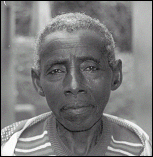
An elderly woman, Thérèse had only
her own moral stature to rely on. With the help
of her daughters, she provided for the needs of
those she was hiding with a steely determination
and in a spirit of generosity despite the material
difficulties. The militia beat one of her daughters,
threw a grenade at the house and eventually raided
it. But they withstood the threats and there are
those alive today who are grateful for their fortitude.
|
The Clergy
Members of the clergy were most likely to have
the means and opportunity to assist the refugees
who made their way to parishes all over the country,
and several who showed selflessness and devotion
to this task are mentioned in this book. Some
were murdered alongside their parishioners. They
acted according to their faith and Christian values.
At the same time, these were unique choices and
struggles undertaken in a hostile context. Clergy
who hid or helped Tutsis often did so without
the support of their superiors in the Church or
even in direct opposition to them. The bravery
of some priests and nuns was so exceptional that
survivors believe they should be recognised as
martyrs or canonised.

Father Joseph Boneza
|
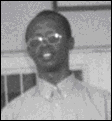
Father Ignace Kabera
|
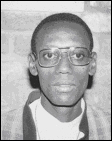
Father Dieudonné Rwakabayiza
These three young priests helped the refuges at
the Parish of Mibilizi in Cyangugu to stay alive
and to challenge the militia, even joining in the
stone-throwing. They kept up the spirits of the
refugees and helped some of them to reach Zaire.
Together, they showed a unity of spirit and purpose
which defied the ideology of ethnic hatred. Fr.
Boneza was murdered in May 1994.
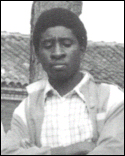 |
Father Baudouin Busunyu
Working against the wishes of his parish priest
and his father who was an interahamwe leader,
Father Busunyu offered sympathy, understanding
and practical assistance to those sheltering
at the Parish of Nkanka in Cyangugu. He bravely
guided refugees to safety in person as far
as Zaire, enduring a beating by a militia
patrol on one occasion.
|
 |
Father Vieko Curic
When most expatriates were evacuated, Father
Vieko, a priest from the former Yugoslavia
who had lived in Nyamabuye, Gitarama for over
ten years, stood by the people of Kivumu during
the worst experiences of their lives. He made
food and medical assistance available to the
displaced at the parish, kept them hopeful
and drove some people to Burundi, hidden in
sacks or by passing them off as corpses and
wounded patients.
|
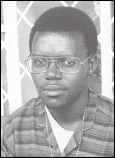 |
Father Célestin Hakizimana
Determined to safeguard those the refuges
at St. Paul's Pastoral Centre in Kigali, Father
Hakizimana kept them alive largely without
external support. He argued face-to-face with
some of the leading perpetrators in Kigali,
insisting that the people in his church were
not guilty of any crime and did not deserve
any punishment. Most of them lived to tell
the tale. His will to do everything in his
power to look after 2000 people has left those
he saved inspired by this extraordinary man.
|
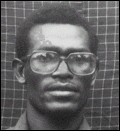 |
Father Jean-Bosco Munyaneza
In Fr. Jean-Bosco Munyaneza, the refugees
at the Parish of Mukarange in Muhazi, Kibungo,
found a leader who organised their struggle
to survive and a man of God who gave them
the courage to face their deaths. When there
was nothing more he could do to keep the killers
at bay, he fought by their side and laid down
his life for them.
|
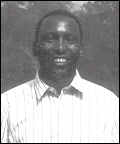 |
Father Jean-Pierre Ngoga
As a defiant individual who did not flinch
from challenging powerful local officials
and genocide leaders directly, Father Ngoga
was under constant threat. His strength and
resilience in fighting off the forces of genocide
gave the refugees at the Parish of Kibeho
in Gikongoro the strength to engage in a battle
for their lives.
|
 |
Sister Félicitée
Niyitegeka
Despite the pleas of her brother, a senior
army officer, and his offer of help, Sister
Félicitée would not desert the
frightened people who flooded to the St Pierre
Centre in Nyundo, Gisenyi which she had helped
establish. She gave them food, medical care
and advice and evacuated the most vulnerable
to Zaire. When the militia abducted them,
she accompanied them. Then she too was murdered.
|
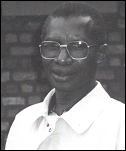 |
Father Oscar Nkundayezu
Father Oscar's determination and practicality
helped in the establishment of an escape network
in Cyangugu which smuggled Tutsis into Zaire,
taking some of them to the lakeshore himself.
Despite ill-health, he went to great lengths
to find food, water and medical treatment
for the refugees at the Parish of Cyangugu
in Kamembe and at Kamarampaka stadium, even
learning to drive in a climate of urgency
in order to deliver supplies.
|
Local Officials
Local officials were expected to show wholehearted
support for the killings. The genocide depended
on their participation and those who held back were
immediately under scrutiny. Yet some fervently defended
the Tutsis in their community, sometimes paying
with their lives.
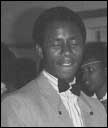 |
Jean-Marie Vianney Gisagara,
Mayor
Gisagara had been a target of threats and
suspicion for his opposition to the genocide
ideology. He instructed local councillors
in Nyabisindu, Butare, to thwart the génocidaires
and appealed for calm, mobilising the communal
police and even making some arrests. He was
assassinated along with 11 members of his
family, including his parents, siblings and
wife both as a punishment and a warning to
others.
|
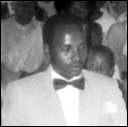 |
Callixte Ndagijimana, Mayor
Refugees from the surrounding regions headed
for Mugina, lured by the news that Callixte
had made exceptional efforts to avoid killings
in his commune. He organised the communal
police force to protect people, making daily
tours to reassure them while spreading messages
of peace. He was killed because of his sense
of duty and brotherhood.
|
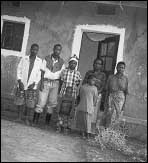 |
Ladislas Uzabakiriho, Councillor
The Family of the Late Ladislas Uzabakiriho
Despite extreme pressure, Ladislas refused
to collaborate with the other local officials
and encouraged the Hutus of Kinzuzi to fight
on behalf of their Tutsi neighbours, most
of whom were escorted to safety. Today, both
the genocide survivors, and the Hutus from
Kinzuzi who saved them, are deeply grateful
to him for the sense of solidarity that he
lived by and brought out in others.
|
In Remembrance
The heroes of the genocide should be remembered
in Rwanda and abroad as defenders of human rights
and advocates for humanity. They defied the propaganda
and pressure that overwhelmed a nation, keeping
hope alive through one of the most brutal episodes
of recent history. They showed love, compassion
and integrity, preserving humane values as well
as lives against the destruction of the genocide.
|

